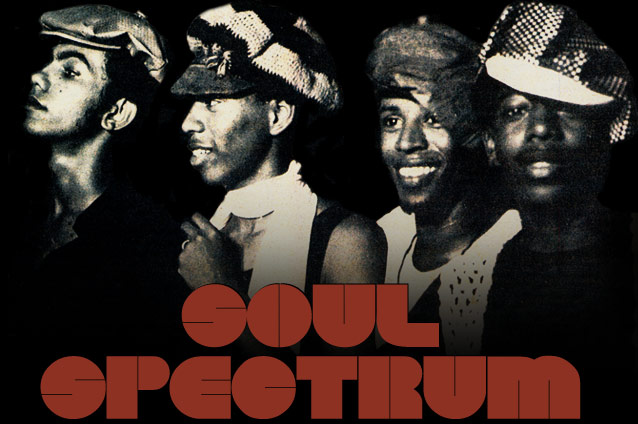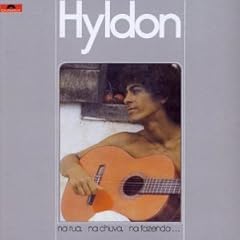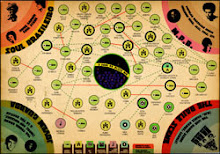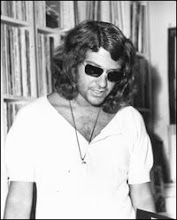
Ok I'm going to get a little bit obsessive. But in my approximately 25 years of chasing records, I have rarely been as impressed by a tune in the way I'm impressed with "Step Forward" by Leroy Stewart. I really care about this record. Might be my favorite recording ever.
In a way, it isn't special at all. A little about the record business in the place where this it comes from—Jamaica, West Indies: in the 1970s the commerce was (and to a lesser extent still is) all about 45s, not albums. These 45s were released at a frantic pace, recorded and mixed quickly and pressed on cheap crackly vinyl with the record label applied out-of-center and the song title sometimes written by hand, or not at all.
Vocalists were dime-a-dozen, often lining up outside the studios for a chance to impress a producer with their skills and perhaps get a chance at the microphone to earn a few bucks. Dozens of tunes might be recorded over the same popular backing track, and producers would work to make it sound different each time, through the mixing. Engineers might mix 3,4, 10 records in a day.
My point is that "Step Forward" is something that was produced quickly in assembly-line fashion, to the extent that the people who made it might not even remember doing it. But that's also part of the charm. When you're one of too many singers in the neighborhood who want to make a record for a pretty well-known producer, the pressure is on to perform well.
This is gospel music, straight up. This vocalist—who to our knowledge didn't make any other records—has a delivery that can only come from a total devotion to what he's saying. He probably grew up singing in the church, like many Jamaican singers then and now. But there's something truly exceptional about this performance. All I can hear is a hungry guy who, after an eternity of waiting to make a record, finally gets his chance, and just leaves his entire soul on the tape.
But apart from the virtuoso singing, there are a few other strange and wonderful features of this record. For some reason, 100% of the vocal sound is on one side of the stereo spectrum [stereo means there's two tracks, one for each speaker, but usually they have a lot in common], such that you basically have an instrumental on the other track. The production is super spare, like there's a cathedral of space between the instruments.
But my favorite thing about it just might be there by mistake. Maybe on purpose, but more likely because the tape machine wasn't properly maintained, the vocal track has a "bleed" that gives you a faint echo of each word about a half second before (not after) every note he sings. It's like delay, but in reverse, and combined with this particular singing performance, it's an astonishing ghostly effect.
As I said, it's pretty likely that this same backing track was used on multiple records with different singers, and that the engineer tried whatever creative things he could think of to make the track sound different each time. On this version, he's gone particularly spare. He uses the hi-hat as the anchor.

Imagine what a mixing board looks like, with sliding faders that control the volume of each instrument. Then imagine the mixing board with all the faders except the hi-hat channel turned all the way down. "Tsit-tsit-tsit-tsit…" Starting from that base, he adds touches of each instrument by sliding the faders up and down, sometimes seemingly at random, to complement the vocal, like a painter adding colors.
I love how he takes out the bass line when the chorus starts, and brings it back much later than you think it should, like he had to lean over and get the telephone and missed the beat. But that just adds to the sense of tense anticipation that pervades the whole thing.
Listening to this tune, you're on the edge of your seat, waiting for everything.
You're waiting for the bass player to finish each ten-note loop. If you notice, in that loop there's almost more resting than playing. "Boop boo boo boop [wait wait wait] boop boo boop [wait] boo boo [wait] boo [wait wait wait wait wait]."
You're waiting for the snare drum to come back and devastate your ear. There are only three proper appearances of the snare in the whole song (not counting the intro), and the rest of the drum strokes are all on the rim, which gives tons of power to the real snare sound when it finally arrives.
And in hearing him beg you over and over to "Please live good!", you're waiting for your heathen self to just give up and accept God in the way that this dude does.
So without further ado, here's "Step Forward" by Leroy Stewart, original release date and label unknown. We do know that it was released on Live & Love records in the UK in the 1970s and later featured on the US compilation LP "All that Jazzbo" in the early 1990s, but it’s likely there was a small Jamaican pressing at some stage. The producer may have been Prince Jazzbo, but given the vintage, our sources suspect it was engineered at King Tubby’s or elsewhere. Thanks to Flashman for turning me on to this, and for the research assistance.
Leroy Stewart - Step Forward[Note: If you listen on little computer speakers, you're wasting your time. It was made to be played on giant speaker cabinets in a huge dirt lot full of sweaty people. At least put on some headphones!]

 I'm a big fan of Brazilian DJ records from the 1970s. Taking a look at the tracks that were picked and all of the pictures and documentation of that era is like a secret window into a scene that is long gone. Sure, the Baile Funk parties that continue to rage in the same neighborhoods of Rio owe alot to their precursors such as the the parties thrown by Luizinho Disc Jockey Soul and his cohorts. This particular LP is from 1977 and shows what the height of the Black Rio DJ scene was all about. This album has got some serious funk on it and most of it is pretty deep. I've picked my favorite four cuts from here, but there are some other great ones to sample. If this scene is interesting to you and you wanna learn more, check out Thomas Fawcett's excellent website - Brazil Soul Power. Further down, I embedded a clip from the film "City of God" otherwise known as "Cidade de Deus" which has a scene depicting a favela soul baile. If you haven't seen the movie, check it out (the music is SUPERB!) or just peep the video to get a taste of what one of these 1970s soul parties must have been like. You gotta love the cover of this album. You just couldn't do this in the US! But Brazilian racial politics are different and being a "white" guy who DJs "black" music you could legitimately dress up as a half-black-face uncle sam. God Bless Brazil!
I'm a big fan of Brazilian DJ records from the 1970s. Taking a look at the tracks that were picked and all of the pictures and documentation of that era is like a secret window into a scene that is long gone. Sure, the Baile Funk parties that continue to rage in the same neighborhoods of Rio owe alot to their precursors such as the the parties thrown by Luizinho Disc Jockey Soul and his cohorts. This particular LP is from 1977 and shows what the height of the Black Rio DJ scene was all about. This album has got some serious funk on it and most of it is pretty deep. I've picked my favorite four cuts from here, but there are some other great ones to sample. If this scene is interesting to you and you wanna learn more, check out Thomas Fawcett's excellent website - Brazil Soul Power. Further down, I embedded a clip from the film "City of God" otherwise known as "Cidade de Deus" which has a scene depicting a favela soul baile. If you haven't seen the movie, check it out (the music is SUPERB!) or just peep the video to get a taste of what one of these 1970s soul parties must have been like. You gotta love the cover of this album. You just couldn't do this in the US! But Brazilian racial politics are different and being a "white" guy who DJs "black" music you could legitimately dress up as a half-black-face uncle sam. God Bless Brazil! 





























